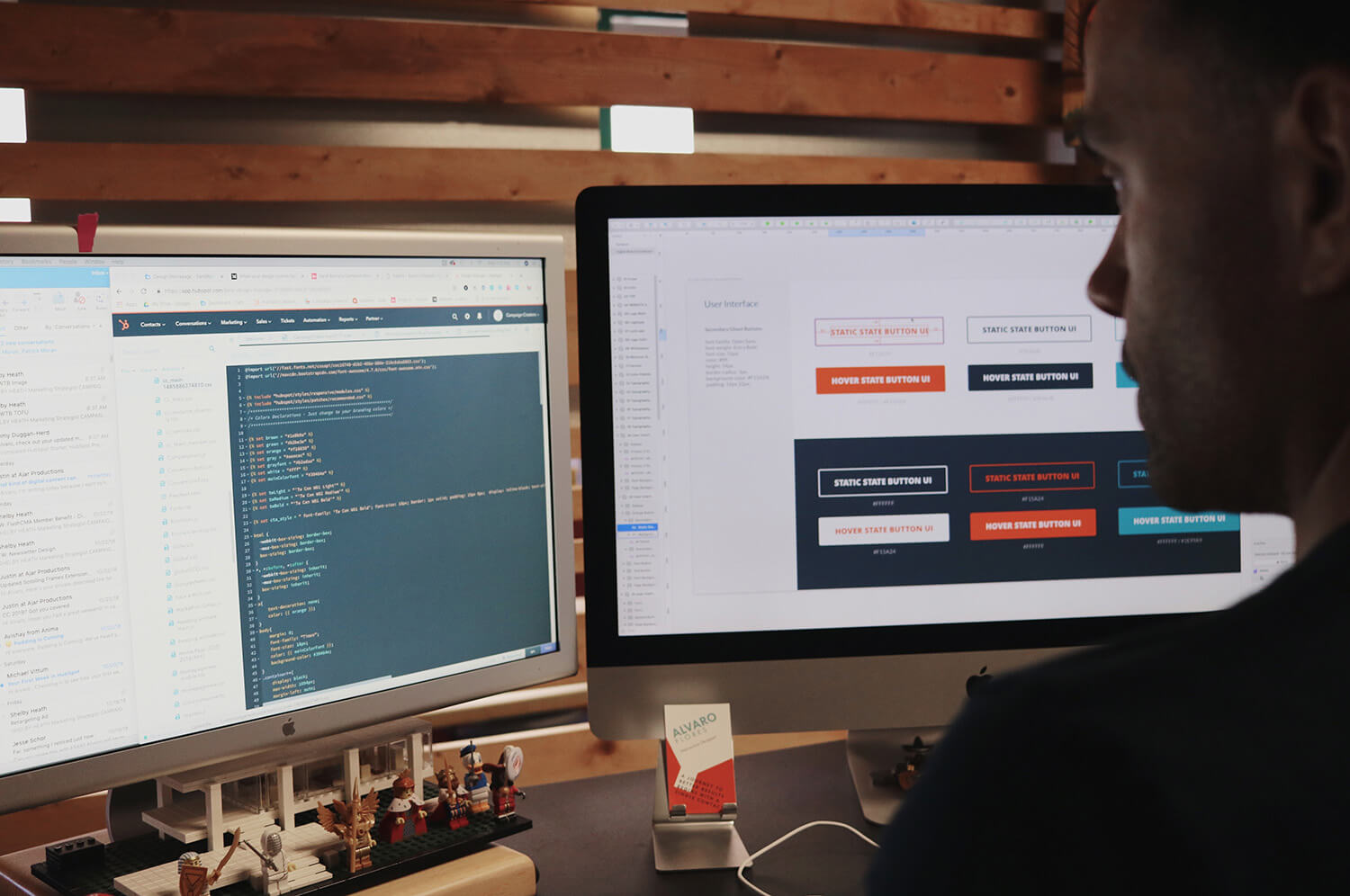Web application or a desktop one? Read on for a detailed comparison of their performance, security, connectivity, and other key factors - and find out which one would suit your business best.
When developing software, every company must answer this question at some point - which type of application platform to choose? A Web or a Desktop app?
In 2020, 52.4%t of the global population accessed the Internet. This figure is projected to rise to 53.7% in 2021. With increasing internet use worldwide, web applications have significantly grown in popularity. This tendency has only intensified with the growth of companies switching to remote work.
However, it would be best to make a choice based on a much broader analysis. This decision is intended to have a positive impact on the customer experience and success of your business. So which solution will work best for your product?
You're in the right place to finally discover the answer! This article will help you spot the differences, look at the problem from a customer’s perspective, and help you make this hard decision.
Let's start from the very beginning.
Web vs Desktop apps: what are they?
At a glance:
Web App: no need to download or install anything on your device, as a session will take place entirely within a browser.
Desktop App: you have to download and install software as an application directly to your device.
Web applications
Web apps are software applications accessed through a browser and an internet connection. It doesn’t require space on your computer since the files are located on a remote server. You can easily switch between devices on which you use these tools because you just need the Internet to access them and their features.
How do they differ from a usual web page? You probably already use them in your daily work. They typically give you much more interactivity - the possibility to edit, create, and make changes. Sounds familiar? Most likely you know about such web apps as Canva, Google docs, or any email service, which all use the technology.
Desktop applications
Desktop apps are the type of software that application development began with. You install them directly to your PC or other devices. In contrast to web apps, they take up space on your hard drive, but you can use them without internet access.
Some of them still need the Internet to perform their features though, such as web browsers or programs used by multiple users. These are still categorized as desktop applications though.

The fight: Web app vs Desktop app
▸ Installation process
To start using a web application, you need to take just one simple step. Going to the right URL address is sufficient to have access to the features of the software, although some of them will require you to register and set up an account. Thanks to that, though, you will have all your work saved in one place or access to more features. However, many of them are available as soon as the page is loaded.
The situation is different in the case of desktop applications. Every single one needs to be installed on each device separately. It’s a mandatory step to start using the software’s features. Unfortunately, that means you can’t use it wherever you are (unless you have said devices with you).
Score:
Web App 1:0 Desktop App
▸ Connectivity
Web applications can’t exist without an Internet connection. For sure, access to the Internet has never been better or easier than now and it’s possible to be connected most of the time. Nevertheless, who hasn’t encountered a situation when their Internet connection stopped working at the most crucial moment?
Fortunately, smart developers have made solutions designed to help customers in the event of disconnection. They allow users to continue their work, which will be sent and saved on the servers right after the connection is restored.
Even though the Internet is generally available everywhere, there are places where the connection stability is poor and will not allow you to work smoothly. In this case, independent desktop applications work better. No matter what, they’re already on your device and you can use them regardless of the connection.
Score:
Web App 1:1 Desktop App

▸ Performance
A weak internet connection can negatively affect the performance of web applications. Their reliance on the Internet can be problematic, especially if they are poorly optimized. This can have a significantly negative impact on the speed at which applications operate. Most web apps don’t need too much power, but as their complexity increases, more issues can be generated. These problems can be managed, but companies choosing this option need to be prepared for such challenges.
In comparison to web applications, desktop ones are independent of the connection and will run at as fast a speed as your device allows them to. The same operations can take much less time than on web apps, and the software can have more prominent features that don’t impact their quality. Desktop applications can work faster, be more responsive, and undoubtedly achieve better performance, which is why the point is awarded to them.
Score:
Web App 1:2 Desktop App
▸ Portability
The main advantage of web applications is their portability. Regardless of your location, you can have access to all your files and app features. You just need access to the Internet, and you can start to work. It’s incredibly convenient, especially now when most companies are switching to remote work.
It looks different for desktop apps. You can’t start to work on one device and then continue your work on another one that readily or easily. Desktop apps are confined to the physical location of the device they are being used on, and that’s why they have usability limitations.
Score:
Web App 2:2 Desktop App

▸ Data storage
Web applications rely on external servers to store their data. Thanks to that, all files are kept in the cloud, and people can access them no matter what device they are using. Internet-based applications are beneficial for companies that work remotely or in a hybrid model. The cloud gives them access to all of their files on any device. Due to the abundant availability of the cloud, storage space is virtually unlimited.
Data collection is a downside of conventional software types. Desktop apps are stored on your device's hard drive, and their output is saved to it as well. Some apps might not use much storage space, but many of them, especially those with graphics or movie editing capabilities, can take up a large amount of memory.
Score:
Web App 3:2 Desktop App
▸ Security
When all data is located somewhere in the cloud, the risk of significant information leaks increases. The data is open to a great number of users, which increases the exposure to potential risk. Customers want to know that their data is being stored securely and not have to worry that they will fall into the wrong hands.
The fact is that desktop applications might be a much safer choice. They are more secure and have more restrictions, making it more challenging to steal sensitive data. However, there are many other ways to minimize the risk, so choosing desktop apps is not the only solution. The security of web app applications is on a higher level than ever before, and is still developing.
The last five years have shown a decrease in the number of sites with severe vulnerabilities. This is a good sign of improvements in security. So the race is still open, but for the moment the point goes to desktop apps.
Score:
Web App 3:3 Desktop App
▸ Updates
One of the most convincing advantages of choosing web applications is automatic updates. They can be applied to all devices at once, so that whenever users open the app they will have access to the latest version. They don’t need to worry about downloading and updating. It may sound like a small thing, but for sure it’s much more convenient and time-saving for users.
Updating desktop applications is much more problematic. All the changes need to be applied separately on each device. The customer may receive a push notification that they can update their application, but this still needs to be done manually by downloading and installing the latest version.
Score:
Web App 4:3 Desktop App

It’s time for web apps
Both desktop and web applications have a lot of advantages, and they both deserve attention. It's good to consider both sides, keeping in mind the specific needs of your company. Many businesses decide to use both solutions at the same time so that customers have a choice. Often, desktop applications have additional, more advanced features or at least those of the web version.
Nevertheless, the increasing number of companies that are switching to remote work has stimulated greater demand for web applications, and they're the winner these days. Businesses that work remotely want to benefit from the many advantages that web app solutions can offer for this system of working.
Many supporters of web applications claim that they're more interactive than desktop versions, but this isn’t the most important point for users. Customers want better security and conversion-centric features in web app development and project design. Flawless performance and safety are the most crucial aspects for them, so as long as web applications are safe people will be using them.
Conclusion
It’s not an easy choice for companies to decide which type of applications they should choose. Both of them can have a significant impact on their business. You have to consider all the pros and cons, what your company can gain from the service, and which features the product should focus on. Only then will you be able to make a considered and accurate decision.
If the choice is too complicated and you want to be sure that the option you decide on is the best one, you can always draw on the expert knowledge of a trusted software development company. Together you’ll be able to find a solution that will be the best fit for your business.
You may be also interested in:
➤ Digital Transformation — definition, benefits, challenges
➤ 6 Common Risks in Software Development Projects – and how to avoid them
➤ How to choose the right Software Development Company for your project?











 Angry Nerds (Poland)
Angry Nerds (Poland) Angry Nerds (USA)
Angry Nerds (USA) Angry Nerds (Canada)
Angry Nerds (Canada)



